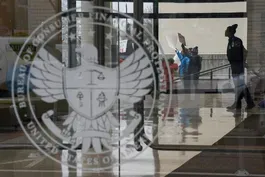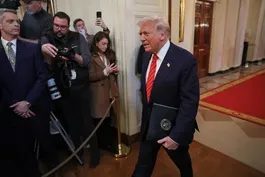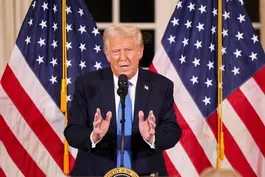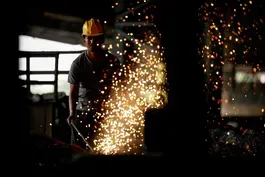
Tamara Keith and Amy Walter on Trump approval polls
Clip: 2/10/2025 | 8m 24sVideo has Closed Captions
Tamara Keith and Amy Walter on what the American public thinks about Trump's 2nd term
NPR’s Tamara Keith and Amy Walter of the Cook Political Report with Amy Walter join Geoff Bennett to discuss the latest political news, including the first polling about how the American public views President Trump's second term so far, Elon Musk's cuts hurting Republican states and Trump saying he doesn't view Vice President Vance as his successor.
Major corporate funding for the PBS News Hour is provided by BDO, BNSF, Consumer Cellular, American Cruise Lines, and Raymond James. Funding for the PBS NewsHour Weekend is provided by...

Tamara Keith and Amy Walter on Trump approval polls
Clip: 2/10/2025 | 8m 24sVideo has Closed Captions
NPR’s Tamara Keith and Amy Walter of the Cook Political Report with Amy Walter join Geoff Bennett to discuss the latest political news, including the first polling about how the American public views President Trump's second term so far, Elon Musk's cuts hurting Republican states and Trump saying he doesn't view Vice President Vance as his successor.
How to Watch PBS News Hour
PBS News Hour is available to stream on pbs.org and the free PBS App, available on iPhone, Apple TV, Android TV, Android smartphones, Amazon Fire TV, Amazon Fire Tablet, Roku, Samsung Smart TV, and Vizio.
Providing Support for PBS.org
Learn Moreabout PBS online sponsorshipGEOFF BENNETT: We are now seeing some of the first polling about how the American public views President Trump's second term so far.
For that and the other political headlines of the day, we turn to our Politics Monday duo.
That's Amy Walter of The Cook Political Report With Amy Walter and Tamara Keith of NPR.
Hello, hello.
AMY WALTER, The Cook Political Report: Hello.
GEOFF BENNETT: So President Trump has started his term with net positive marks from Americans overall.
That's according to a new CBS News/YouGov poll.
He's got a 53 percent approval rating, and many of his policies have majority support like immigration, his handling of the situation in Gaza.
Amy, when you look at these numbers, what do you see?
AMY WALTER: Well, this is -- this one poll definitely starts Donald Trump in a place he didn't spend any time in his first term, which is above 50 percent approval rating.
Now, if you look at the average of all the polls that have been taken since he has started his tenure as president, he's a little bit lower than that, but still in positive territory.
I think there are a couple of things to note about it.
The first is, historically, his overall approval rating is lower than where most presidents have been.
But what's the most telling and the most unique is how high his disapproval ratings are.
Usually, a first-term president comes in, even though, as we know, this isn't your typical first-term president, but with a certain amount of benefit of the doubt from the other side.
And so, if you look at somebody, say, like Ronald Reagan, his overall approval ratings when he first came in weren't that high.
They were somewhere in the low 50s, but his disapproval ratings were like eight.
This is 47 percent.
So, there is a dug-in opposition to Donald Trump.
The one -- that's why the number that's going to be the most important, I think, going forward is looking at whether that opposition to him grows, rather than looking just at his approval rating number.
GEOFF BENNETT: Yes.
Another important number in this poll, Tam, is that 66 percent of respondents also think he's not spending enough time on the thing that he was elected to do, and that's lower prices.
I remember talking about the price of eggs being $4 being too high, and it's gone well above that.
TAMARA KEITH, National Public Radio: I think it's around twice that much now.
So, the price of eggs is a very real issue that is affecting real people when they go into the grocery store every time they go into the grocery store.
Now, the reality is, that's bird flu.
It is not something that the president of the United States has direct control over.
And, frankly, the president of the United States does not have a lot of levers to pull to bring down prices broadly in the economy.
That said, some of the things that President Trump is doing, including raising tariffs, just announced 25 percent on aluminum and steel and other tariffs that he's talking about, generally speaking, mainstream economists will say that raising tariffs is essentially raising prices on the American people in the end.
So he is doing some things that don't seem to move in the direction of lowering prices.
His White House is definitely not talking about prices very much.
It is not their emphasis.
Their emphasis is on things that they do have more control over, like immigration, like picking public fights, like saying that he's going to ban paper straws.
AMY WALTER: Yes.
And let's be clear.
Also, in those polls, what people are telling pollsters is that they think that Donald Trump is actually living up to what he said he was going to do.
So the fact that he's taking action and people see that he's actually following through on things - - I have been listening in on some focus groups of voters who voted for Biden last time around, voted for Trump this time, and that's really one of the main takeaways, was, they said, well, at least he's doing something.
He said he was going to try all these things and he's doing it.
GEOFF BENNETT: And it raises the question, Tam, how do Democrats and Trump critics, how do they respond to this?
I mean, Democrats spent years saying that Donald Trump was in many ways unfit for public office.
He was a threat to democracy.
He gets reelected.
TAMARA KEITH: Right.
GEOFF BENNETT: Now there are all sorts of concerns about this, as they see it, an unconstitutional power grab, and he's got this high favorability.
TAMARA KEITH: Yes, so there's a lot of licking of wounds that is still happening among Democrats.
Right now, I think as we speak, there are Democratic lawmakers and others protesting outside of the Consumer Financial Protection Bureau protesting Elon Musk.
I think that what Democrats have realized is that Elon Musk is less popular than Donald Trump, so they are certainly putting emphasis on him.
And they are also trying, though they haven't exactly gotten there yet, but they are trying to bring the focus back to prices whenever they can.
And they are trying to figure out a way to defend the government without defending the government, because it turns out a lot of voters think the government is too big and think the government doesn't work for them.
And so Democrats are kind of struggling, I would argue, to figure out a way to defend institutions while not also defending the status quo, yes.
AMY WALTER: Defending institutions.
Yes.
GEOFF BENNETT: There is this dynamic, though, where Donald Trump and Elon Musk, this approach of using a hammer, instead of a scalpel, in this effort to remake the federal government.
It has the effect of hurting red states.
We heard from Senator Jerry Moran of Kansas, who warned about USAID, since foreign aid is directly connected to U.S. agriculture.
Katie Britt of Alabama raised concerns about cuts to biomedical research at the NIH, how that could affect that state, not just Alabama, but Texas, North Carolina.
The list goes on.
We also heard from senator from New Hampshire... TAMARA KEITH: Susan Collins.
GEOFF BENNETT: Susan Collins.
Thank you.
I was blanking there for a second.
So, I mean, talk to me about that.
AMY WALTER: That's right.
There are definitely repercussions to this, and you all have been reporting it on too, of health centers that have not gotten their funding, et cetera.
So there are real-life consequences that are happening to people in red states and blue states.
That said, when I was growing up in politics, there was the theory that all politics is local, and that what happens to your constituents is the most important thing that you can do.
You have to deliver for your constituents.
All politics now is more national.
And I think, to me, the most important quote that I have seen yet from an elected official about why they are choosing to support, or at least not stand up and say no to some of the things that Trump is doing that might hurt them is the chairman of the National Republican Campaign Committee was quoted saying that, look, Trump has a mandate, and our job is to make sure that mandate gets fulfilled.
Essentially, this midterm election coming up is a referendum on whether we fulfilled Trump's mandate.
And, to be clear, Trump did better in a lot of these congressional districts than they did.
So they're looking at somebody who defied political gravity time and time again.
It's going up against their old model of what politics used to be, and Trump has been beating the old model for a long time now.
GEOFF BENNETT: As we track the many differences in this new model of politics, I'm not sure if we have time to play the sound, but Donald Trump -- we do.
So here's Donald Trump responding to a question about whether J.D.
Vance is his successor.
Let's take a listen.
BRET BAIER, FOX News Anchor: Right now, do you view Vice President J.D.
Vance as your successor, the Republican nominee in 2028?
DONALD TRUMP, President of the United States: No.
But he's very capable.
I mean, I don't think that it -- I think you have a lot of very capable people.
So far, I think he's doing a fantastic job.
It's too early.
BRET BAIER: Right.
DONALD TRUMP: We're just starting.
GEOFF BENNETT: Can you imagine any other president giving an answer like that and it's not being disqualifying or just completely upends the career, the future career of a vice president?
TAMARA KEITH: No, but this is Donald Trump and he just says what he's thinking.
And sort of transparently, he is saying, well, it's early.
Donald Trump is still joking that he's not going to leave office in four years.
So -- and, also, he is someone... GEOFF BENNETT: We assume it's a joke.
I mean... TAMARA KEITH: Well, right.
That's fair.
But also he likes to pick winners.
He likes to associate himself with winners.
And he kind of waits to see who's really going to be a winner.
AMY WALTER: I think that is a very good point.
Plus, talking about your successor this early on is ceding your own power.
And he does not like to do that.
GEOFF BENNETT: Amy Walter and Tamara Keith, thanks, as always.
AMY WALTER: You're welcome.
TAMARA KEITH: You're welcome.
California faces insurance crisis amid extreme weather
Video has Closed Captions
California faces insurance crisis as homeowners lose coverage amid extreme weather (9m 6s)
Chad Wolf on Trump's progress in reshaping immigration
Video has Closed Captions
Chad Wolf breaks down Trump's progress in reshaping America's immigration system (7m 42s)
Ex-CFPB director discusses Trump's effort to shut agency
Video has Closed Captions
Former CFPB director says Trump 'begging for another financial crisis' by closing agency (5m)
How the courts may serve as a check on Trump's presidency
Video has Closed Captions
How the courts may serve as a check on Trump's presidency (8m 38s)
Judge says Trump ignoring his order to pause funding freeze
Video has Closed Captions
Federal judge says Trump administration ignoring his order to pause funding freeze (3m 35s)
News Wrap: Hamas accuses Israel of breaking ceasefire deal
Video has Closed Captions
News Wrap: Ceasefire at risk as Hamas accuses Israel of breaking parts of agreement (4m 43s)
Trump escalates trade battle with steel, aluminum tariffs
Video has Closed Captions
Trump escalates his trade battles with new tariffs on steel and aluminum (4m 54s)
Providing Support for PBS.org
Learn Moreabout PBS online sponsorshipMajor corporate funding for the PBS News Hour is provided by BDO, BNSF, Consumer Cellular, American Cruise Lines, and Raymond James. Funding for the PBS NewsHour Weekend is provided by...



















